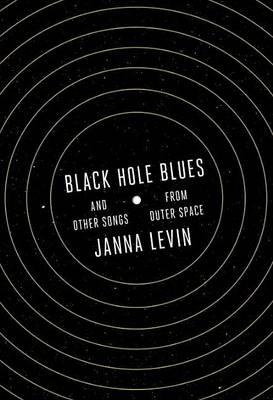On her literary blog Brain Pickings the incomparable Maria Popova writes: In his groundbreaking 1915 paper on general relativity, Albert Einstein envisioned gravitational waves — ripples in the fabric of space-time caused by astronomic events of astronomical energy. Although fundamental to our understanding of the universe, gravitational waves were a purely theoretical construct for him. He lived in an era when any human-made tool for detecting something this faraway was simply unimaginable, even by the greatest living genius, and many of the cosmic objects capable of producing such tremendous tumult — black holes, for instance — were yet to be discovered.
One September morning in 2015, almost exactly a century after Einstein published his famous paper, scientists turned his mathematical dream into a tangible reality — or, rather, an audible one. In Black Hole Blues and Other Songs from Outer Space — one of the finest and most beautifully written books I’ve ever read — astrophysicist and novelist Janna Levin tells the story of LIGO and its larger significance as a feat of science and the human spirit. Levin, a writer who bends language with effortless might and uses it not only as an instrument of thought but also as a Petri dish for emotional nuance, probes deep into the messy human psychology that animated these brilliant and flawed scientists as they persevered in this ambitious quest against enormous personal, political, and practical odds.”
The Laser Interferometer Gravitational-Wave Observatory — an enormous international collaboration known as LIGO, consisting of two massive listening instruments 3,000 kilometers apart, decades in the making — recorded the sound of a gravitational wave produced by two mammoth black holes that had collided more than a billion years ago, more than a billion light-years away.
One of the most significant discoveries in the history of science, this landmark event introduces a whole new modality of curiosity in our quest to know the cosmos, its thrill only amplified by the fact that we had never actually seen black holes before hearing them. Nearly everything we know about the universe today, we know through five centuries of optical observation of light and particles. Now begins a new era of sonic exploration. Turning an inquisitive ear to the cosmos might, and likely will, revolutionize our understanding of it as radically as Galileo did when he first pointed his telescope at the skies.
Levin — who has written beautifully about free will and the relationship between genius and madness — paints the backdrop for this improbable triumph:
Somewhere in the universe two black holes collide — as heavy as stars, as small as cities, literally black (the complete absence of light) holes (empty hollows). Tethered by gravity, in their final seconds together the black holes course through thousands of revolutions about their eventual point of contact, churning up space and time until they crash and merge into one bigger black hole, an event more powerful than any since the origin of the universe, outputting more than a trillion times the power of a billion Suns. The black holes collide in complete darkness. None of the energy exploding from the collision comes out as light. No telescope will ever see the event.
What nobody could see LIGO could hear — a sensitive, sophisticated ear pressed to the fabric of space-time, tuned to what Levin so poetically eulogizes as “the total darkness, the empty space, the vacuity, the great expanse of nothingness, of emptiness, of pure space and time.” She writes of this astonishing instrument:
An idea sparked in the 1960s, a thought experiment, an amusing haiku, is now a thing of metal and glass.
But what makes the book most enchanting is Levin’s compassionate insight into the complex, porous, often tragic humanity undergirding the metal and glass — nowhere more tragic than in the story of Joseph Weber, the controversial pioneer who became the first to bring Einstein’s equations into the lab. Long before LIGO was even so much as a thought experiment, Weber envisioned and built a very different instrument for listening to the cosmos.
Weber was born Yonah Geber to a family of Lithuanian Jewish immigrants in early-twentieth-century New Jersey. His mother’s heavy accent caused his teacher to mishear the boy’s name as “Joseph,” so he became Joe. After he was hit by a bus at the age of five, young Joe required speech rehabilitation therapy, which replaced his Yiddish accent with a generic American one that led his family to call him “Yankee.” As a teenager, he dropped out of Cooper Union out of concern for his parents’ finances and joined the Navy instead, where he served on an aircraft carrier that was sunk during WWII. When the war ended, he became a microwave engineer and was hired as a professor at the University of Maryland at the then-enviable salary — especially for a 29-year-old — of $6,500 a year.





